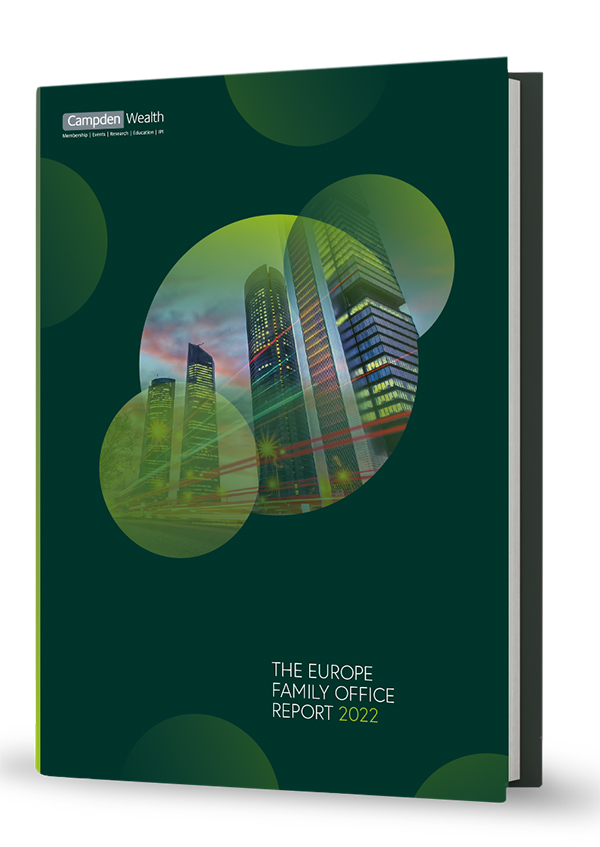European Family Office Report: Uncertain times lead to certain measures with an increased focus on private equity

After a tumultuous few years and with even more uncertainty set for the foreseeable future, Europe-based family offices are proactively adopting inflation-mitigating investment strategies, according to Campden Wealth’s new European Family Office Report 2022.
The final part of an extensive Global Family Office survey (following the 2022 North American and Asia-Pacific reports), the European Family Office Report follows an extraordinary year in which the lasting effects of the COVID-19 pandemic, war in Europe, economic mismanagement and political instability have loomed large.
With soaring inflation, increasing interest rates, collapsing stock markets and imminent recessions, family offices have shown typical adaptability when adjusting the mix of their portfolios to deal with a more difficult environment.
“For European family offices, private equity has come centre stage, representing 27% of the average family office portfolio,” says Dr. Rebecca Gooch, Campden Wealth’s senior director of research. “It’s often the best performing asset class and, in 2021, direct investments delivered an average return of 22% and private equity funds 17%.
“These performances were critical in enabling European family offices' portfolios to achieve an average return of 13% for the year. Not surprisingly, around 40% of family offices signalled their desire to increase allocations through 2022/2023. That being said, valuations in private markets tend to follow what happens in public markets, and therefore these intentions might be scaled back.”
Of all investment risk currently troubling family offices, inflation is the most commonly cited (according to 78% of respondents), with increasing geopolitical tensions (61%) and rising interest rates (54%) also proving to be ongoing worries. Popular strategies to mitigate inflation risk include increasing exposure to equities (49%), real estate (33%), and commodities (33%), and reducing the duration of bond portfolios (28%).
“Family offices have been proactive in attempting to mitigate the adverse impact of inflation on investment performance,” says Dr. Gooch. “Going forward, these measures may provide some insulation for family offices from difficult conditions in financial markets.”
Clearly intent on weathering the storm, many European family offices (68%) now operate conservative, balanced investment strategies focusing on wealth preservation, rather than growth.
Family offices are there to manage a family’s long-term wealth... it’s common for them to invest in nascent, emerging technologies which may not deliver returns for years.
That said, exposure to private equity markets has increased to 27% of assets under management (AUM) and this upward trend is likely to continue, since 45% of respondents are looking to increase their allocation to what is now the most popular asset class for new investment.
“Exit activity was the strongest ever and the strong performance of stock markets lifted valuations,” says Dr. Gooch. “Sadly, these exceptional conditions didn’t continue into the current year, but family offices, unlike investment managers and hedge funds, can afford to take a long-term view.”
It has not been all conservative investment and risk-averse investment strategies this year, however, as technology continues to be a draw for European family offices. Tech sectors marked out for future investment are green tech (53% of family offices already invested are looking to increase their allocation), healthcare tech (46%), digital transformation (42%), fintech (39%), water tech (39%) and artificial intelligence (37%).
“Family offices are there to manage a family’s long-term wealth and, therefore, it’s common for them to invest in nascent, emerging technologies which may not deliver returns for years,” says Dr. Gooch. “Even though some investments fail, families still get the benefit of being exposed to emerging technologies at a very early stage. Our survey found that one-in-three European family offices have an investment in blockchain and one-in-five in the metaverse.”
Cryptocurrency has had a difficult year and European family offices have concerns about its volatility. However, they continue to hold onto and, in some cases, intend to increase their investment.
“28% of European family offices are invested in cryptocurrency but, on average, crypto represents a minor 1% of their average AUM,” says Dr. Gooch. “Thus, family offices in general are only testing the waters. For many, these holdings are speculative. They may provide an upside if crypto becomes a widely accepted asset class, but family offices also aim to limit the downside if this fails to materialise.”
Sustainable investing, meanwhile, has had a boost this year, with two-thirds of European family offices engaging. On average, among these investors, sustainable investments account for 36% of their portfolios. This proportion is expected to grow to 43% within the next five years (the comparable figures for family offices globally are 27% and 38%).
“Climate change mitigation (67%) is the most commonly targeted theme adopted by European family offices engaged in sustainable investing, followed by health and social care (64%) and water management (62%),” says Dr. Gooch. “A notable 78% of European family offices recognise families’ responsibility to make the world a better place; it’s their primary motivation for investing sustainably. More than half (51%) are keen to demonstrate that their wealth can be used to create positive change.”
Click below to find out more about the Asia-Pacific Family Office Report 2022.








